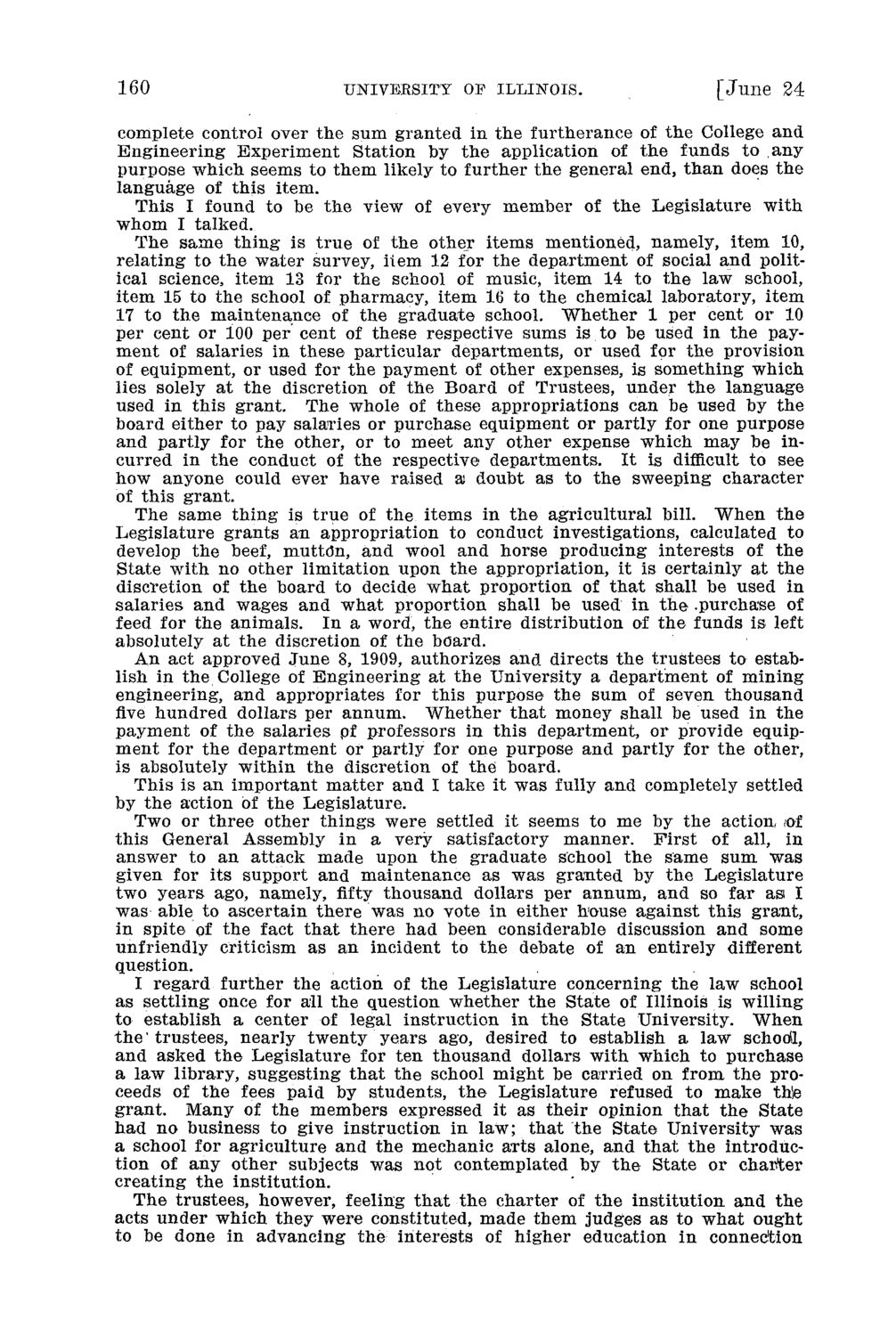| |
| |
Caption: Board of Trustees Minutes - 1910
This is a reduced-resolution page image for fast online browsing.

EXTRACTED TEXT FROM PAGE:
160 UNIVERSITY OF I L L I N O I S . [June 24 complete control over the sum granted in the furtherance of the College and Engineering Experiment Station by the application of the funds to any purpose which seems to them likely to further the general end, than does the language of this item. This I found to be the view of every member of the Legislature with whom I talked. The same thing is true of the other items mentioned, namely, item 10, relating to the water survey, item 12 for the department of social and political science, item 13 for the school of music, item 14 to the law school, item 15 to the school of pharmacy, item 16 to the chemical laboratory, item 17 to the maintenance of the graduate school. Whether 1 per cent or 10 per cent or 100 per cent of these respective sums is to be used in the payment of salaries in these particular departments, or used for the provision of equipment, or used for the payment of other expenses, is something which lies solely at the discretion of the Board of Trustees, under the language used in this grant. The whole of these appropriations can be used by the board either to pay salaries or purchase equipment or partly for one purpose and partly for the other, or to meet any other expense which may be incurred in the conduct of the respective departments. It is difficult to see how anyone could ever have raised a doubt as to the sweeping character of this grant. The same thing is true of the items in the agricultural bill. When the Legislature grants an appropriation to conduct investigations, calculated to develop the beef, muttdn, and wool and horse producing interests of the State with no other limitation upon the appropriation, it is certainly at the discretion of the board to decide what proportion of that shall be used in salaries and wages and what proportion shall be used in the .purchase of feed for the animals. In a word, the entire distribution of the funds is left absolutely at the discretion of the board. An act approved June 8, 1909, authorizes and directs the trustees to establish in the College of Engineering at the University a department of mining engineering, and appropriates for this purpose the sum of seven thousand five hundred dollars per annum. Whether that money shall be used in the payment of the salaries pf professors in this department, or provide equipment for the department or partly for one purpose and partly for the other, is absolutely within the discretion of the board. This is an important matter and I take it was fully and completely settled by the action of the Legislature. Two or three other things were settled it seems to me by the action, .of this General Assembly in a very satisfactory manner. First of all, in answer to an attack made upon the graduate school the same sum was given for its support and maintenance as was granted by the Legislature two years ago, namely, fifty thousand dollars per annum, and so far asi I was able to ascertain there was no vote in either house against this grant, in spite of the fact that there had been considerable discussion and some unfriendly criticism as an incident to the debate of an entirely different question. I regard further the action of the Legislature concerning the law school as settling once for all the question whether the State of Illinois is willing to establish a center of legal instruction in the State University. When the' trustees, nearly twenty years ago, desired to establish a law school, and asked the Legislature for ten thousand dollars with which to purchase a law library, suggesting that the school might be carried on from the proceeds of the fees paid by students, the Legislature refused to make thle grant. Many of the members expressed it as their opinion that the State had no business to give instruction in law; that the State University was a school for agriculture and the mechanic arts alone, and that the introduction of any other subjects was not contemplated by the State or charter creating the institution. The trustees, however, feeling that the charter of the institution and the acts under which they were constituted, made them judges as to what ought to be done in advancing the interests of higher education in connection
| |